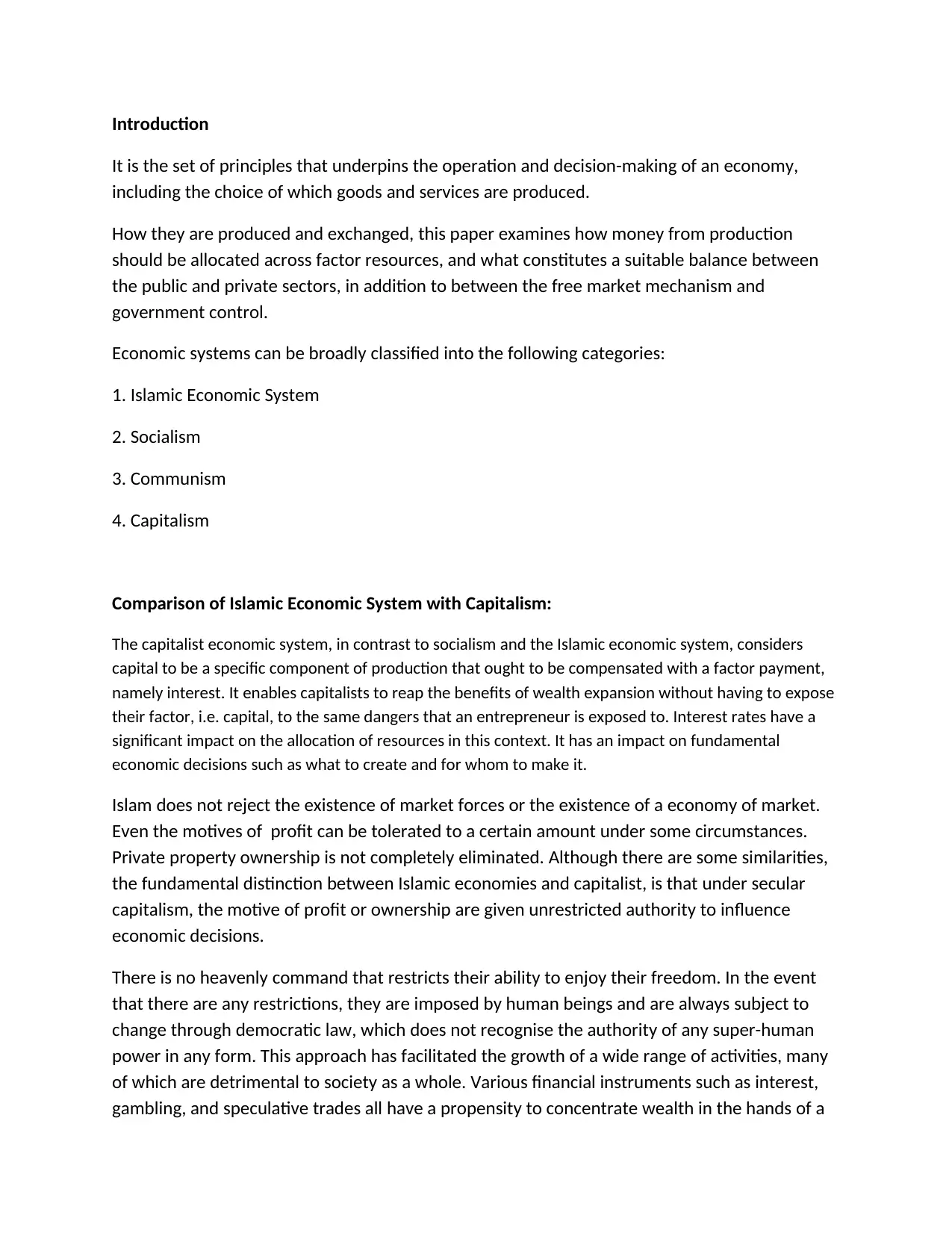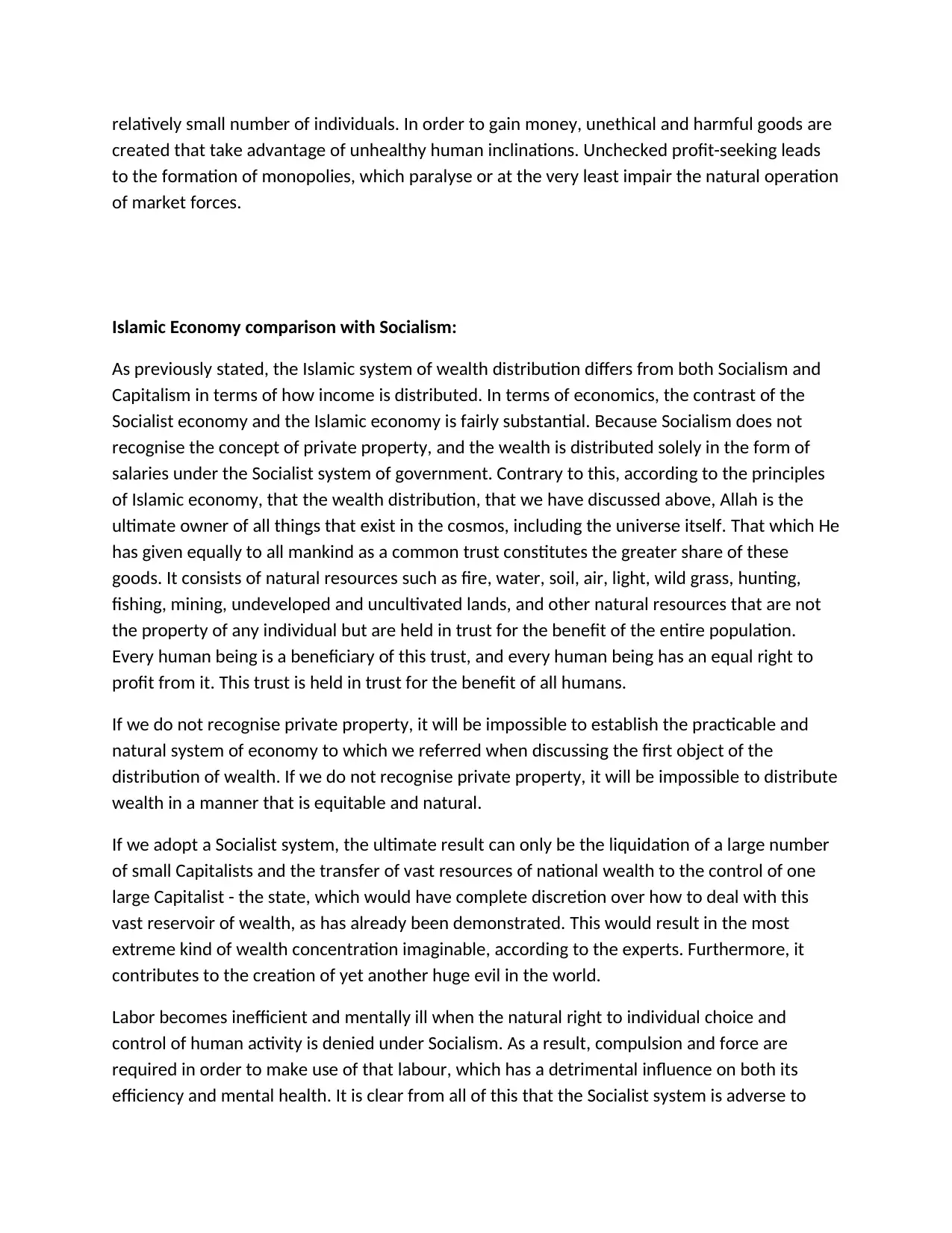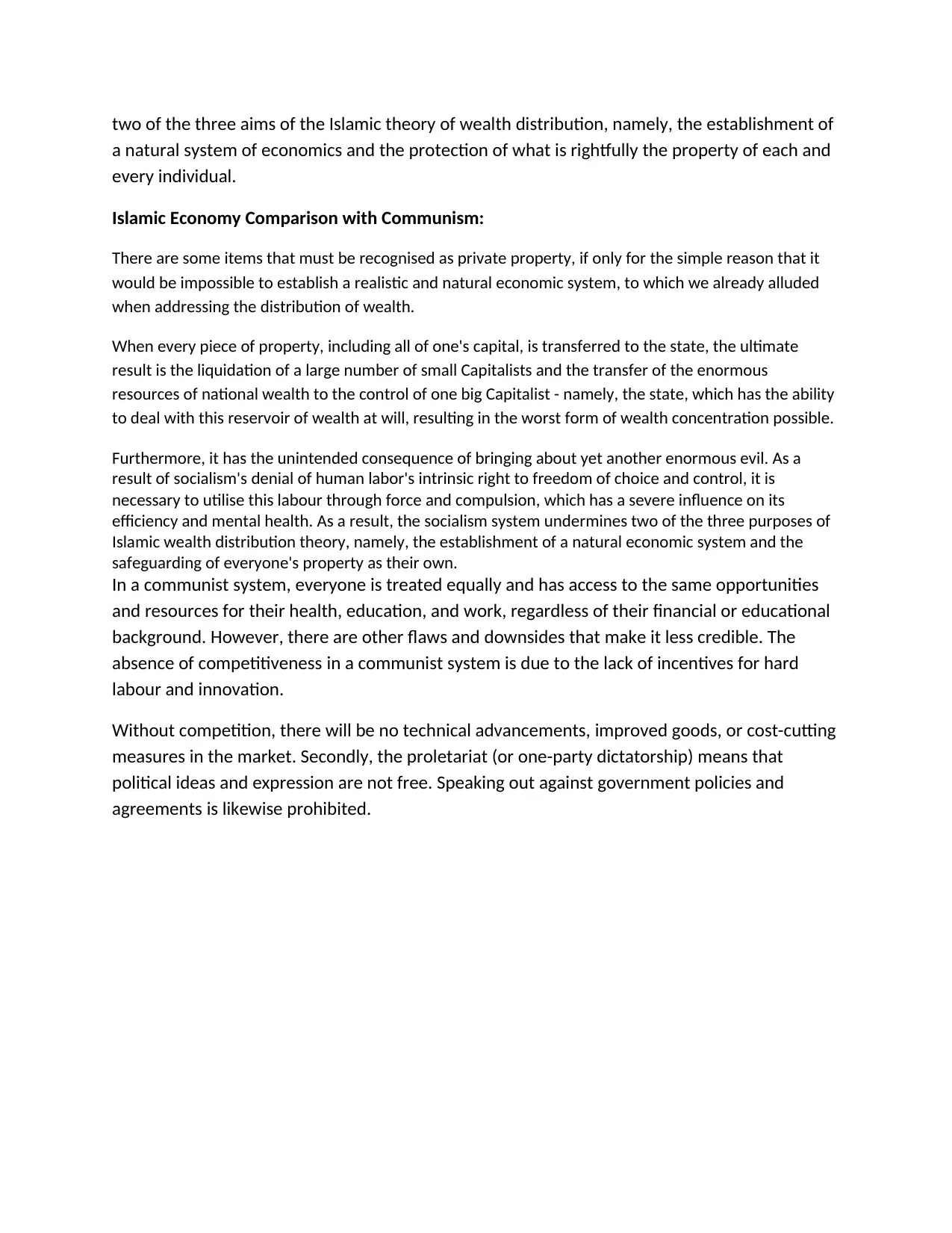Comparative Analysis of Economic Systems: Islamic Perspective
VerifiedAdded on 2022/01/18
|3
|1284
|193
Essay
AI Summary
This essay provides a comparative analysis of the Islamic economic system with capitalism, socialism, and communism. It begins by outlining the fundamental principles of an economic system, focusing on the production, distribution, and exchange of goods and services. The essay then contrasts the Islamic economic system with capitalism, highlighting differences in the treatment of capital and interest, and discussing the role of market forces and private property. Further comparisons are made with socialism and communism, focusing on wealth distribution, the recognition of private property, and the impact on individual freedom and economic efficiency. The essay underscores the unique aspects of the Islamic economic system, including its approach to wealth distribution, its stance on interest, and its emphasis on ethical considerations in economic activities, differentiating it from both capitalist and socialist models.

Introduction
It is the set of principles that underpins the operation and decision-making of an economy,
including the choice of which goods and services are produced.
How they are produced and exchanged, this paper examines how money from production
should be allocated across factor resources, and what constitutes a suitable balance between
the public and private sectors, in addition to between the free market mechanism and
government control.
Economic systems can be broadly classified into the following categories:
1. Islamic Economic System
2. Socialism
3. Communism
4. Capitalism
Comparison of Islamic Economic System with Capitalism:
The capitalist economic system, in contrast to socialism and the Islamic economic system, considers
capital to be a specific component of production that ought to be compensated with a factor payment,
namely interest. It enables capitalists to reap the benefits of wealth expansion without having to expose
their factor, i.e. capital, to the same dangers that an entrepreneur is exposed to. Interest rates have a
significant impact on the allocation of resources in this context. It has an impact on fundamental
economic decisions such as what to create and for whom to make it.
Islam does not reject the existence of market forces or the existence of a economy of market.
Even the motives of profit can be tolerated to a certain amount under some circumstances.
Private property ownership is not completely eliminated. Although there are some similarities,
the fundamental distinction between Islamic economies and capitalist, is that under secular
capitalism, the motive of profit or ownership are given unrestricted authority to influence
economic decisions.
There is no heavenly command that restricts their ability to enjoy their freedom. In the event
that there are any restrictions, they are imposed by human beings and are always subject to
change through democratic law, which does not recognise the authority of any super-human
power in any form. This approach has facilitated the growth of a wide range of activities, many
of which are detrimental to society as a whole. Various financial instruments such as interest,
gambling, and speculative trades all have a propensity to concentrate wealth in the hands of a
It is the set of principles that underpins the operation and decision-making of an economy,
including the choice of which goods and services are produced.
How they are produced and exchanged, this paper examines how money from production
should be allocated across factor resources, and what constitutes a suitable balance between
the public and private sectors, in addition to between the free market mechanism and
government control.
Economic systems can be broadly classified into the following categories:
1. Islamic Economic System
2. Socialism
3. Communism
4. Capitalism
Comparison of Islamic Economic System with Capitalism:
The capitalist economic system, in contrast to socialism and the Islamic economic system, considers
capital to be a specific component of production that ought to be compensated with a factor payment,
namely interest. It enables capitalists to reap the benefits of wealth expansion without having to expose
their factor, i.e. capital, to the same dangers that an entrepreneur is exposed to. Interest rates have a
significant impact on the allocation of resources in this context. It has an impact on fundamental
economic decisions such as what to create and for whom to make it.
Islam does not reject the existence of market forces or the existence of a economy of market.
Even the motives of profit can be tolerated to a certain amount under some circumstances.
Private property ownership is not completely eliminated. Although there are some similarities,
the fundamental distinction between Islamic economies and capitalist, is that under secular
capitalism, the motive of profit or ownership are given unrestricted authority to influence
economic decisions.
There is no heavenly command that restricts their ability to enjoy their freedom. In the event
that there are any restrictions, they are imposed by human beings and are always subject to
change through democratic law, which does not recognise the authority of any super-human
power in any form. This approach has facilitated the growth of a wide range of activities, many
of which are detrimental to society as a whole. Various financial instruments such as interest,
gambling, and speculative trades all have a propensity to concentrate wealth in the hands of a
Paraphrase This Document
Need a fresh take? Get an instant paraphrase of this document with our AI Paraphraser

relatively small number of individuals. In order to gain money, unethical and harmful goods are
created that take advantage of unhealthy human inclinations. Unchecked profit-seeking leads
to the formation of monopolies, which paralyse or at the very least impair the natural operation
of market forces.
Islamic Economy comparison with Socialism:
As previously stated, the Islamic system of wealth distribution differs from both Socialism and
Capitalism in terms of how income is distributed. In terms of economics, the contrast of the
Socialist economy and the Islamic economy is fairly substantial. Because Socialism does not
recognise the concept of private property, and the wealth is distributed solely in the form of
salaries under the Socialist system of government. Contrary to this, according to the principles
of Islamic economy, that the wealth distribution, that we have discussed above, Allah is the
ultimate owner of all things that exist in the cosmos, including the universe itself. That which He
has given equally to all mankind as a common trust constitutes the greater share of these
goods. It consists of natural resources such as fire, water, soil, air, light, wild grass, hunting,
fishing, mining, undeveloped and uncultivated lands, and other natural resources that are not
the property of any individual but are held in trust for the benefit of the entire population.
Every human being is a beneficiary of this trust, and every human being has an equal right to
profit from it. This trust is held in trust for the benefit of all humans.
If we do not recognise private property, it will be impossible to establish the practicable and
natural system of economy to which we referred when discussing the first object of the
distribution of wealth. If we do not recognise private property, it will be impossible to distribute
wealth in a manner that is equitable and natural.
If we adopt a Socialist system, the ultimate result can only be the liquidation of a large number
of small Capitalists and the transfer of vast resources of national wealth to the control of one
large Capitalist - the state, which would have complete discretion over how to deal with this
vast reservoir of wealth, as has already been demonstrated. This would result in the most
extreme kind of wealth concentration imaginable, according to the experts. Furthermore, it
contributes to the creation of yet another huge evil in the world.
Labor becomes inefficient and mentally ill when the natural right to individual choice and
control of human activity is denied under Socialism. As a result, compulsion and force are
required in order to make use of that labour, which has a detrimental influence on both its
efficiency and mental health. It is clear from all of this that the Socialist system is adverse to
created that take advantage of unhealthy human inclinations. Unchecked profit-seeking leads
to the formation of monopolies, which paralyse or at the very least impair the natural operation
of market forces.
Islamic Economy comparison with Socialism:
As previously stated, the Islamic system of wealth distribution differs from both Socialism and
Capitalism in terms of how income is distributed. In terms of economics, the contrast of the
Socialist economy and the Islamic economy is fairly substantial. Because Socialism does not
recognise the concept of private property, and the wealth is distributed solely in the form of
salaries under the Socialist system of government. Contrary to this, according to the principles
of Islamic economy, that the wealth distribution, that we have discussed above, Allah is the
ultimate owner of all things that exist in the cosmos, including the universe itself. That which He
has given equally to all mankind as a common trust constitutes the greater share of these
goods. It consists of natural resources such as fire, water, soil, air, light, wild grass, hunting,
fishing, mining, undeveloped and uncultivated lands, and other natural resources that are not
the property of any individual but are held in trust for the benefit of the entire population.
Every human being is a beneficiary of this trust, and every human being has an equal right to
profit from it. This trust is held in trust for the benefit of all humans.
If we do not recognise private property, it will be impossible to establish the practicable and
natural system of economy to which we referred when discussing the first object of the
distribution of wealth. If we do not recognise private property, it will be impossible to distribute
wealth in a manner that is equitable and natural.
If we adopt a Socialist system, the ultimate result can only be the liquidation of a large number
of small Capitalists and the transfer of vast resources of national wealth to the control of one
large Capitalist - the state, which would have complete discretion over how to deal with this
vast reservoir of wealth, as has already been demonstrated. This would result in the most
extreme kind of wealth concentration imaginable, according to the experts. Furthermore, it
contributes to the creation of yet another huge evil in the world.
Labor becomes inefficient and mentally ill when the natural right to individual choice and
control of human activity is denied under Socialism. As a result, compulsion and force are
required in order to make use of that labour, which has a detrimental influence on both its
efficiency and mental health. It is clear from all of this that the Socialist system is adverse to

two of the three aims of the Islamic theory of wealth distribution, namely, the establishment of
a natural system of economics and the protection of what is rightfully the property of each and
every individual.
Islamic Economy Comparison with Communism:
There are some items that must be recognised as private property, if only for the simple reason that it
would be impossible to establish a realistic and natural economic system, to which we already alluded
when addressing the distribution of wealth.
When every piece of property, including all of one's capital, is transferred to the state, the ultimate
result is the liquidation of a large number of small Capitalists and the transfer of the enormous
resources of national wealth to the control of one big Capitalist - namely, the state, which has the ability
to deal with this reservoir of wealth at will, resulting in the worst form of wealth concentration possible.
Furthermore, it has the unintended consequence of bringing about yet another enormous evil. As a
result of socialism's denial of human labor's intrinsic right to freedom of choice and control, it is
necessary to utilise this labour through force and compulsion, which has a severe influence on its
efficiency and mental health. As a result, the socialism system undermines two of the three purposes of
Islamic wealth distribution theory, namely, the establishment of a natural economic system and the
safeguarding of everyone's property as their own.
In a communist system, everyone is treated equally and has access to the same opportunities
and resources for their health, education, and work, regardless of their financial or educational
background. However, there are other flaws and downsides that make it less credible. The
absence of competitiveness in a communist system is due to the lack of incentives for hard
labour and innovation.
Without competition, there will be no technical advancements, improved goods, or cost-cutting
measures in the market. Secondly, the proletariat (or one-party dictatorship) means that
political ideas and expression are not free. Speaking out against government policies and
agreements is likewise prohibited.
a natural system of economics and the protection of what is rightfully the property of each and
every individual.
Islamic Economy Comparison with Communism:
There are some items that must be recognised as private property, if only for the simple reason that it
would be impossible to establish a realistic and natural economic system, to which we already alluded
when addressing the distribution of wealth.
When every piece of property, including all of one's capital, is transferred to the state, the ultimate
result is the liquidation of a large number of small Capitalists and the transfer of the enormous
resources of national wealth to the control of one big Capitalist - namely, the state, which has the ability
to deal with this reservoir of wealth at will, resulting in the worst form of wealth concentration possible.
Furthermore, it has the unintended consequence of bringing about yet another enormous evil. As a
result of socialism's denial of human labor's intrinsic right to freedom of choice and control, it is
necessary to utilise this labour through force and compulsion, which has a severe influence on its
efficiency and mental health. As a result, the socialism system undermines two of the three purposes of
Islamic wealth distribution theory, namely, the establishment of a natural economic system and the
safeguarding of everyone's property as their own.
In a communist system, everyone is treated equally and has access to the same opportunities
and resources for their health, education, and work, regardless of their financial or educational
background. However, there are other flaws and downsides that make it less credible. The
absence of competitiveness in a communist system is due to the lack of incentives for hard
labour and innovation.
Without competition, there will be no technical advancements, improved goods, or cost-cutting
measures in the market. Secondly, the proletariat (or one-party dictatorship) means that
political ideas and expression are not free. Speaking out against government policies and
agreements is likewise prohibited.
⊘ This is a preview!⊘
Do you want full access?
Subscribe today to unlock all pages.

Trusted by 1+ million students worldwide
1 out of 3
Related Documents
Your All-in-One AI-Powered Toolkit for Academic Success.
+13062052269
info@desklib.com
Available 24*7 on WhatsApp / Email
![[object Object]](/_next/static/media/star-bottom.7253800d.svg)
Unlock your academic potential
Copyright © 2020–2026 A2Z Services. All Rights Reserved. Developed and managed by ZUCOL.





